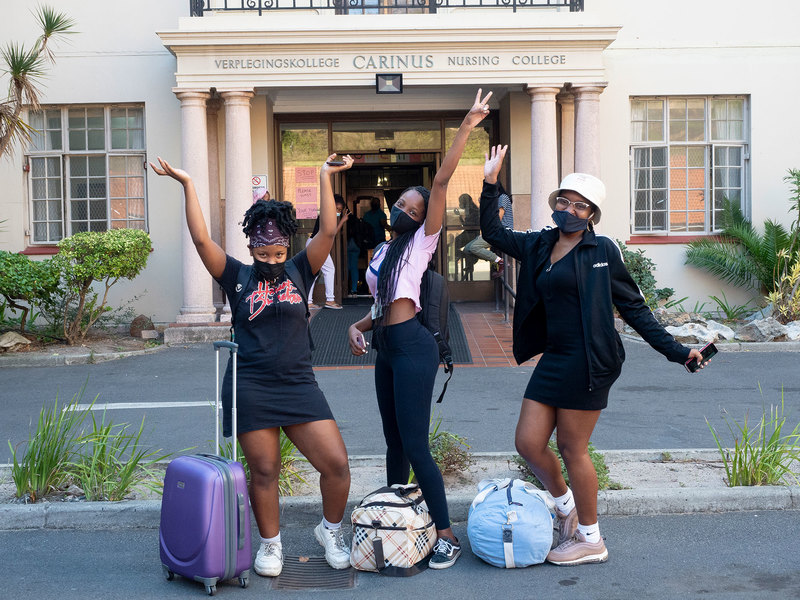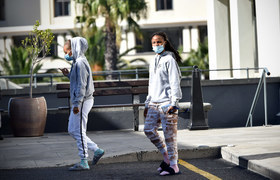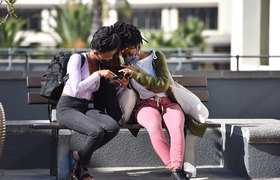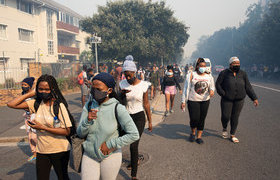Relief as displaced students return to residences
30 April 2021 | Story Nadia Krige. Read time 9 min.
A palpable sense of relief seemed to permeate the air on Thursday, 22 April, as University of Cape Town (UCT) students who had been evacuated during last week’s wildfire returned to their residences.
Shortly after evacuation, the displaced students were taken to emergency accommodation sites. While most were put up in more than 20 hotels across the city, others were taken in by friends and family members. Following thorough safety checks and cleaning operations to remove residual ash from the rooms and communal areas, most residences were given the all-clear to welcome students back on Thursday.
Smuts Hall and Fuller Hall on upper campus were, however, damaged in the fire and have been unable to reopen. Students were allowed back inside on Thursday to collect their belongings before returning to their temporary accommodation sites.
“I felt like the storm was over.”
“I felt like the storm was over,” said Dr Rethabile Possa-Mogoera, the warden of Fuller Hall and the head of UCTʼs African Languages and Literatures section. “I am so happy they have been able to get their things.
“Only one room has been affected badly,” she said. “Other than that, our alarm system has burned and some of our windows are broken due to the heat. This could have been worse when you see how [badly burned] the trees and plants surrounding the building are.”
The student whose room was badly damaged lost her bedding, books, fridge, kettle and food, but fortunately her wardrobe – where she had left her laptop – was untouched. Dr Memory Muturiki, the director of the Student Wellness Service (SWS), was present to support her when she returned to her room.
Stress and worry at Fuller
Fuller Hall resident Eileen Sibanda recalled being terrified and confused when the call to evacuate came. “I did not know what to grab and what to leave behind. I was really afraid that we would not make it out in time.”
She left all her study materials in her room and didn’t know whether she would find them in one piece upon return. “As a result, I could not study the whole time, which is not good.”
Cara-Mia Bester, a first-year student, shared a similar experience: “For the past four days, I haven't been able to do any course work. I was very worried and stressed about my belongings and what the next move will be.
“There was a lot of exaggeration on social media about the degree of damage to Fuller Hall, which did not help the situation.”
Bester said that although the circumstances were terrible, she has been overwhelmed with support from friends, family members and even strangers.
Warm welcome
At other residences across campus, warm welcomes awaited returning students as they arrived by Jammie Shuttle in COVID-19 compliant groups.
Brightly coloured “Welcome home” banners decorated entrances while friendly staff members performed health checks and made sure everyone was safe and comfortable.
“This morning, my team and I painted a banner and put it up in front at the main gate,” said Carmencita Kerchhoff, the residence facilities and COVID-19 compliance officer at Forest Hill. “And when our students started arriving, we were there to welcome them and say that we’re so glad they’re safe.”
At Carinus, students were received by front desk assistant Luci Cupido and handyman Wilson Pieterse. While Cupido greeted each one with a “Welcome home, my dear”, Pieterse handed out complementary bottles of hand sanitiser.
“I missed them and was worried about them,” he said.
Kopano warden Associate Professor Sure Mataramvura said he was grateful the students had been evacuated and were able to return to their residence safely.
“In a disaster, things are never 100% smooth, but I really appreciate what UCT has been doing,” he said. “It was quite a challenging situation, but we did our best.”
With cheerful chatter ringing through the corridors of Carinus, groups of friends relaxing outside Kopano and an energetic group of Forest Hill residents celebrating their return with a game of basketball, it was clear that students were settling right back in.
Not, however, without a measure of wistfulness about having to leave behind the luxuries of hotel life.
Mixed feelings
“In some ways it’s quite sad, because we obviously enjoyed staying in the hotel; it was something new,” said Deepika Mabeer, a fourth-year medical student and subwarden at Carinus. “But it is a relief to get back to work.”
To the amusement of his friends, Kopano resident Siphuvuyo Mnxunyeni said: “Well, I’m not happy to be back, I won’t lie. I was living the soft life, so it’s a pity that all came to an end. But at the same time, business had to be done, because we’re here to study.”
Bongani Chauke from University House wasted no time in getting back to practising his lay-ups and dunks on the basketball court at Forest Hill.
“The hotels were great. I wouldn’t mind being there one more day, but it’s good to be back,” he said. “I can’t wait to get back to studying, because I need to finish this term successfully and I also missed playing basketball a lot. That’s why I’m back here again on the first day!”
While they had enjoyed the “soft life”, most students reported having difficulty focusing in the unfamiliar setting, which was aggravated by a general feeling of uncertainty and unease.
“It was a nice experience, but you can’t really enjoy it because you’re also worried about what happened on campus and the fire,” said Ezile Msinga, a student residing at Carinus.
Melusi Gumbi from neighbouring Clarendon House said, “It was difficult to adjust because you’re always waiting for the next announcement to find out what happens next. You’re always alert, so you can’t really focus.”
Call for re-evaluation of evacuation procedures
Overall, the students seem to have taken the upheaval in their stride and are aware of the various structures – including the SWS – that they can rely on for support.
“Chatting to the students as they returned, what stood out to me was that a lot of them focused on what to be thankful for,” said Kerchhoff.
While the students are grateful to be safe, a few felt that the evacuation process didn’t happen as smoothly as it should have.
“I feel like [it] was very disorganised,” said Kaamila Sissing, a second-year Forest Hill resident. “Fire is something that has always been a threat and [the evacuation] should have been better structured. Even though we do fire drills, there was no lining up, no checking who’s here and who’s not.”
Bester said: “The fact that I am alive is enough reason not to be negative about the situation, but I do feel that UCT should have had a better plan of action for situations like these. I also feel that they took too long before they started evacuation at Fuller and Smuts.”
Both Sissing and Bester feel that the emergency measures that are in place need to be evaluated.
In the meantime, SWS is at the ready to support students dealing with anxiety and trauma. Bookings for counselling can be made made online or via email (sws@uct.ac.za).
 This work is licensed under a Creative Commons Attribution-NoDerivatives 4.0 International License.
This work is licensed under a Creative Commons Attribution-NoDerivatives 4.0 International License.
Please view the republishing articles page for more information.














































